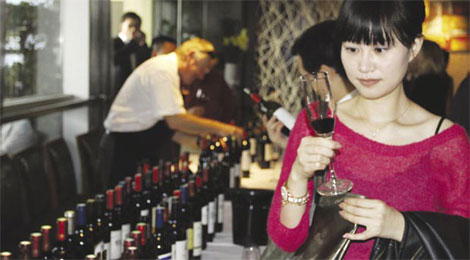 |
| A visitor tastes wine at a wine festival in Wuhan, Central China's Hubei province. [Sun Xinming / For China Daily] |
The next time you walk into a supermarket or restaurant in the United States or in a European country, take a look at the range of wines on the shelves or on the menu. Chances are you may find the "Made-in-China" label on a few of the bottles.
Given that China is the world's largest exporter of goods, you might think that's nothing unusual. But recently, China has been exporting more of its own wines to compete with traditional winemaking countries.
More importantly, many Chinese winemakers recently told China Daily that wineries have been paying more attention to quality in a nation where taste is becoming more polished and fewer Chinese are mixing their wine with soda or Sprite.
"I didn't believe Asia was able to produce good wine 30 years ago, but today I tasted world-class wine here in China," said Michel Rolland, a wine consultant and enologist during a recent visit to China.
China has been exporting wines since the 1950s, but the wines were mostly known for its low prices and subpar taste.
China's wine exports peaked in 2008, when 5.9 million liters of wine worth $21 million were shipped to major wine-consuming countries (the US and Europe topped the list), according to National Bureau of Statistics.
Exports slacked during the financial crisis to 1.8 million liters of wine at $7.4 million. By comparison, the US exported $912 million worth of wine, down nearly 10 percent from 2008.
From 2006 to 2009, the total vineyard coverage in China amounted to 50,000 hectares with more than 500 commercial producers of wine - half of which popped up in the last decade, according to the International Organization of Vine and Wine.
"First, (China) exported textiles. A decade ago, China started to export cars. Now it's wine," said Fan Ying, an economics professor at Beijing-based China Foreign Affairs University, using three kinds of goods to show the country's shift from an exporter of cheap-labor products to higher value-added goods.
One way to explain China's shift toward more and better wine is that "as more and more Chinese go abroad, which promotes Chinese culture and language overseas, the taste for Chinese wine has grown as well", said Guo Songquan, a wine consultant. "Chinese wineries today are paying more attention to quality than they did in the past."
In the town of Changli in Hebei province, known as the "Asian Bordeaux" because the town lies on the same geographic line of latitude as the French region, some wineries are adopting a concept that they call "chateau wine". They said they adopted the process from winemaking regions in Europe in order to make higher quality wines.
The wineries in Changli have small vineyards and employ strict environmental control measures. They also have elaborate grape growing and winemaking techniques, eschewing the large-scale industrialized production techniques of major winemakers such as the Great Wall Wine Co.
Bodega Langes winery, which is named after its owner, the Austrian entrepreneur and crystal czar, Gernot Langes-Swarovski, is one of the more unique wineries in Changli.
"We have one of the best production facilities in the world - we use gravity processing," said Ren Jing, director and general manager of Bodega Langes. "Unlike pumps used in mass production lines, the gravity system will not cause lots of air to get in and hurt the structure of wine."
One unusual technique that the vineyard employs is music. Grapes in the 200-hectare vineyard and the wines stored in the oak barrels in the cellar are played waltzes from Johann Strauss II because Ren said "wine is alive. We let them listen to the music, so they can be influenced by Austrian culture".
Even though the lowest price for a Bodega Langes bottle is more than $30, with some wines costing around $1,000 (Swarovski crystals decorate the bottles), winning customers over is not an issue.
"We focus on quality, not volume, and we only produce about 600,000 bottles per year," Ren said. "Once you get the consumers to know what good wine really is, they will buy it."
But not everyone is buying the fact that China is producing better wines. Duan Changqing, a wine geneticist at China Agricultural University, said many winemaking areas in China such as the Shacheng and Changli areas of Hebei province in North China look promising, but that there is not much incentive for China's major wine producers to improve quality when many Chinese consumers have little knowledge of fine wines.
"The elements in China are not yet favorable for exporting, because many wineries are still importing wines from foreign countries to meet the needs of domestic consumers," Duan said.
While Guo didn't counter that notion, he did say that "China, as the fastest growing country of wine, has the potential to produce good wine, and the best way to prove it is to let them go out and make Chinese wines that will be appreciated overseas".
Nonetheless, smaller, unique wineries in China are cropping up and even French winemakers are taking notice.
Dragon Seal, previously a joint venture with French producer Pernod Ricard but now a State-owned company, is largely influenced by French winemaking techniques. They have employed Bordeaux-trained winemakers and have introduced overseas facilities and production lines in order to narrow down the quality gap between domestic and foreign wines. The company accounted for 39 percent of China's wine exports in 2005.
"We employ a very good French winemaker, Jerome Sabate (winemaker and manager of Jerome Sabate LGI Languedoc Wines in Asia), to control every step of making a good wine," said Yan Chaowei, the import and export manager of Dragon Seal. "Technically it's a Chinese wine with French flavor."
The winery also works with France Castel Freres SAS, which has a very strong presence in France and supplies wines to more than 80 countries.
China Daily |